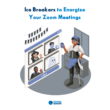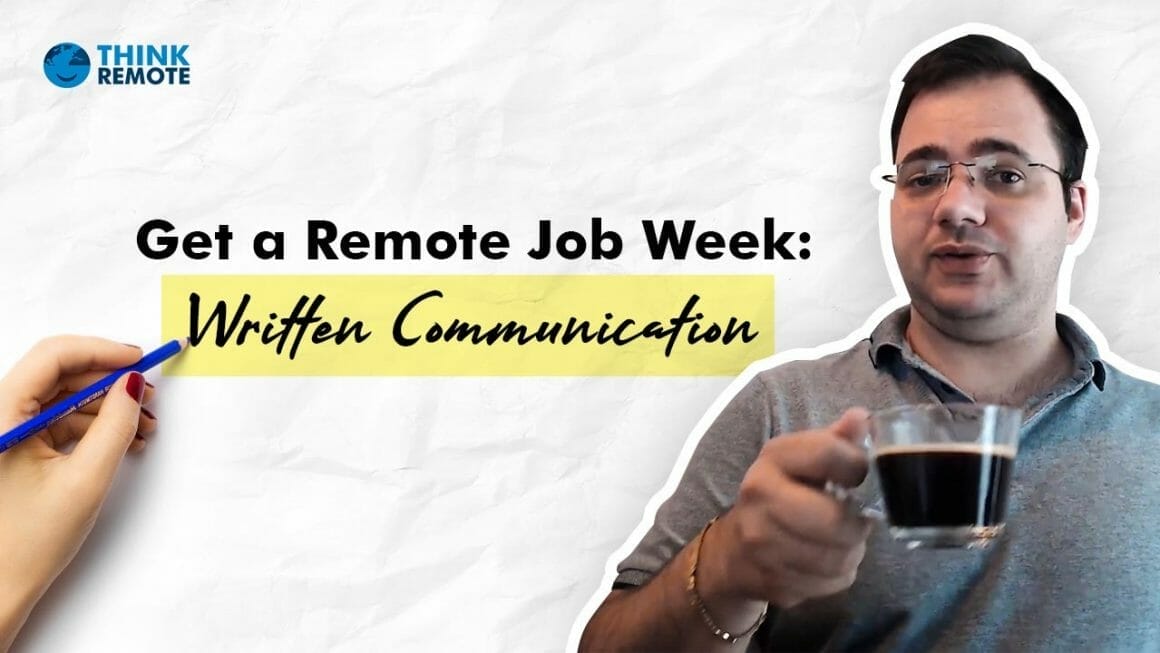For this week, Luis prepared something different: the Get A Remote JOB Week! He’ll talk about everything you need to take into account to get a remote job. Get ready!
So, today Luis shared his insights on written communication. How do you develop at this? Do you pay attention to your written communication when you apply for a new job?
The truth is, written communication is exceedingly important for remote work in general. Even before a remote interview, you must prove you’re excellent at written communication because most of the work you’ll do will be written.
Watch the video to know the four essentials you should include in every sentence for work!
Luis:
This is Get a Remote Job Week at Virtual Coffee Chat with Luis. Today, we’re talking about written communication. So welcome ladies and gentlemen to Virtual Coffee Chat with Luis. This week it’s going to be The Get a Remote Job Week where I’m going to talk about several things that you should take into account if you want to get a remote job. Especially, during the application and interview period. So let’s start right off by having a little sip of coffee, and talk about written communication, right? So written communication is exceedingly important for remote work in general. That’s the first thing that you want to highlight when you’re applying for a remote job. Even before the interview, that you are an expert communicator in the written form, right? This is because most of communication in the remote setting happens written, right? Because no one can stand spending the whole day in video calls and you probably wouldn’t want that job anyway.
So let’s talk about clarity for a moment. Shall we? Clarity of communication is different from brevity. In fact, trying to be brief in your written communication will get you in a world of hurt. Because people will either not fully understand you, or they will think you’re an unpleasant person, right? So that doesn’t mean that you need to embellish. That doesn’t mean that every sentence needs to be preceded by, how are you, I hope you’re okay, how was the weekend, et cetera. No. I mean, obviously, be cordial, greet people the first time you talk with them in a day. But actually don’t put fluff, but put absolutely everything that would be needed in a sentence. Don’t omit words. Now, what happens is that we are used to writing, most people, right? This happens even me, and I’m a writer by trade, but most people are used to writing as if they were speaking, and that’s terrible.
Because when we are in the middle of a conversation, right, it’s very easy to clarify, to omit things. Then to clarify immediately because the person immediately asked for clarification, or you can see by their body language and expression that clarification is needed. This doesn’t happen in written communication. So what usually happens, and this happens a lot and I mean a lot with almost everyone that I’ve ever worked with. It’s a learned skill, and you need to be aware of, you need to be aware of the problem before you fix it. Is that you write stuff that in your mind makes absolute sense and it’s incredibly clear. Because your mind fills in the blanks, but for the other person it’s like gibberish, right? I’m not exaggerating.
So how do you fix this, right? How can you display this when you’re applying for an online job? Display that actually you know exactly how to communicate clearly online. Well, so you need to make sure that your sentence contains at least four things, how, what, when, and why, right? These four things. When you’re talking about something in a sentence, right, you can say, “Oh, can I get the thing for tomorrow?” Right? No. It’s, “Can I get the set of questions? Can I get the set of exercises by tomorrow? So that I can get started on them on X time? Please.” Right? So that’s how things work. Because usually what happens, one of the most frustrating things that happens a lot is, “Oh, When can you see the thing?” Right? You get this message on the Slack asking you, “Hey, when can I see the thing?” You’re, “I’m working on the stuff,” right?
That doesn’t have enough information in it. So be a clear communicator, how, what, when, and why. As you type each sentence in your email, or in Slack, or whatever communication tool you’re using, make sure that it’s perfectly clear what the subject of the sentence is, right? Don’t leave it… Don’t make the other person guess, don’t make the other person figure it out by looking at the previous three or four sentences, right? Make sure that you specify this on every sentence. So of course, spell check is a must, right? Reading comprehension suffers a lot from spelling mistakes, and you can find a nice app for that. I like Grammarly. Grammarly is good.
You also don’t have to try to tell a story every time. I know that it’s very popular in communication circles, that the art of storytelling, right? That you do, you give a lot of examples, a lot phonology, et cetera, et cetera, et cetera. It really gets tiresome after a while, right? So stick to one story, right? If you must tell a story, if you feel that it’s absolutely essential to get your point across to tell a story. Well, in that case, stick to one story per act of communication. Let’s say one story per email, right? Don’t say a story… Don’t make a story for each of your points, that’s just going to drag, and it’s going to feel like communicating with you is like reading a novel. Don’t do it, right? I think I pretty much covers it for written communication, remember? Be clear and concise, but don’t err on the side of brevity. Clear doesn’t mean that it needs to be the shortest sentence possible. Clear means that it needs to contain a how, why, when, and what.
Probably not in this one. I’m probably messing up the word. I mean, the order is up to you, but if it has this four components, right, you will be clear. When I’m reading an email of someone applying for a job that looks that they have it all together, right? That they write something that never leaves any room for doubt, about what’s going to happen, about what the email is about, what’s going to happen, what are the expectations, et cetera. That is a beautiful, beautiful, beautiful start. So that was the first day of our Get a Remote Job Week here at Virtual Coffee Chat with Luis. The idea is that this will be a week where every day, I’m going to expand a bit on the qualities that you should bring to the table when you’re applying for a remote job. So if you’d like to get notified about the next ones, please press the little bell icon next to the video on YouTube. Please press Like, Subscribe, and share it around, because there are plenty of remote jobs to apply for. If you want more such insights, please visit thinkremote.com. See you tomorrow.






